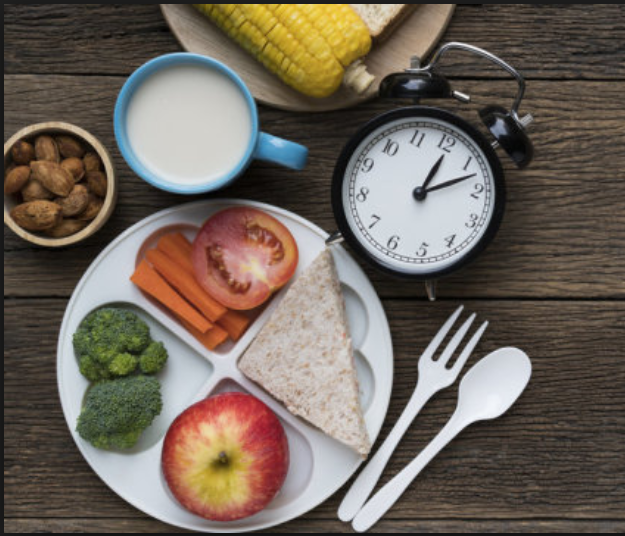nalco group
bone, muscle & joint pain physio
BOOK NOW / WHATSAPP ABOUT YOUR PAIN OR INJURY
- ORCHARD 400 Orchard Road #12-12 Singapore 238875
- TAMPINES 9 Tampines Grande #01-20 Singapore 528735
- SERANGOON 265 Serangoon Central Drive #04-269 Singapore 550265
Home > Blog > Claudia Correia (Clinical Dietitian) > Intermittent Fasting - facts on meals and sleep timing
Intermittent Fasting facts on meals and sleep timing

In the past years, with the growing popularity of intermittent fasting, we have been hearing a lot about the importance of eating and timing.
As a dietitian, there are some aspects related to this popular diet that do not sit easy with me. This diet does not promote healthy eating, or teach its followers about healthy eating.
Also, most people skip breakfast in order to achieve the eight-hour feeding time goal.
Despite this, there is plenty of new evidence that is emerging about the impact of meal timing, weight loss and our health.
This is related to our light/dark cycle, mainly controlled by a structure in our brain located in the hypothalamus.
This brain structure influences the timing of physiological functions in probably all tissues and organs in our body. This cycle is also called the circadian rhythm.
The circadian cycle influences how we use up nutrients, how much energy we use in our daily activities, hormonal production, appetite, and it can even influence our eating behaviour and exercise.
Ultimately, it is believed that the night/light cycle may have an impact in conditions such as diabetes, obesity and cardiovascular diseases.
In some animal studies, it was clear that a disruption of the circadian cycle led to more fat accumulation and, as a result, fatter animals. In humans, we notice how shift workers struggle more with obesity and other health issues.
Right meal timings can have a positive influence on our health and assist in weight loss.
In two separate studies conducted in 2013, it was found that when consuming similar calorie counts, people who had an early lunch or had a heavy breakfast and light dinner, lost more weight than the opposite group – individual who either had a late lunch or a light breakfast and a heavy dinner.
In one of the studies, it was also found that early meals were associated with better health parameters such as fasting glucose levels, insulin, triglycerides and even lower hunger scores.
This has also been my clinical experience as a dietitian. Over the years, I have noticed a clear distinction on my patients' appetite and food cravings, especially on those who skipped breakfast when compared with those who usually would have breakfast.
Even in conditions such as polycystic ovarian syndrome, having a heavier breakfast may increase ovulation, improve insulin resistance and regulate an enzyme known to be responsible for some of the symptoms caused by the condition.
Sleeping duration, the timing of when to go to sleep and eating late at night has been associated with obesity and diabetes. Those who sleep late or less than 5 hours a night together with having heavier meals at night have more risk of being overweight and developing diabetes.
Also, when eating late there seem to be a preference for fatty foods as compared with lunch.
The bottom line:
Eating heavier meals earlier in the day will allow you to improve your metabolism, help you to weight loss and ultimately improve your health.
Aim for:
Healthy and heavier breakfast:

- Have wholegrains, such as oats, wholemeal and multigrain bread, brown/red/wild rice.
- Have a fruit
- Choose a healthy protein: eggs, low-fat dairy, nut butters, beans/peas/lentils/chickpeas, or fish, poultry or lean meat.
- If possible, have some vegetables - you can have them blended in a drink.
- Avoid processed meat, such as bacon and luncheon meat; avoid foods that were cooked with tropical oils such as palm oil and highly processed foods or refined grains such as buns and croissants.
- Choose plain water over sweetened drinks and plain coffee/tea over 3 In 1 drinks
If you are keen to follow intermittent fasting, try to follow an early schedule than a late one, such as 7 am to 3 pm.
Avoid late dinners and suppers.
Sleep early and aim to have at least 7 hours of sleep a night
References
Jakubowicz D, Barnea M, Wainstein J et al (2013) High caloric intake at breakfast vs. dinner differentially influences weight loss of overweight and obese women. Obesity 21: 2504–12. Available at: https://www.ncbi.nlm.nih.gov/pubmed/23512957
Garaulet M, Gómez‐Abellán P, Alburquerque‐Béjar JJ et al (2013) Timing of food intake predicts weight loss effectiveness. International Journal of Obesity 37: 604–11. Available at: https://www.ncbi.nlm.nih.gov/pubmed/23357955
Jakubowics D, Barnea M, Wainstein J, Froy O. (2013) Effects of caloric intake timing on insulin resistance and hyperandrogenism in lean women with polycystic ovary syndrome. Clin Sci (Lond). Nov;125(9):423-32. Available at: https://www.ncbi.nlm.nih.gov/pubmed/23688334
Asher G, Sassone-Corsi P. (2015) Time for Food: The Intimate Interplay between Nutrition, Metabolism, and the Circadian Clock. Cell 161(1):84-92. Available at: https://www.sciencedirect.com/science/article/pii/S0092867415003025#fig1
